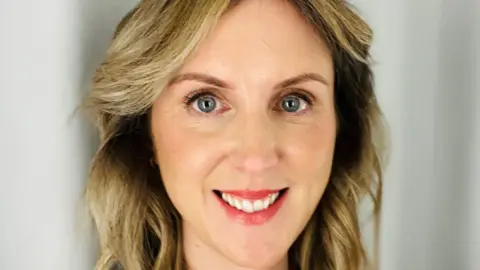'Remember the alternative and book your smear'
 Laura Waudby
Laura Waudby"I just don't understand people who say it's embarrassing, it's degrading, it's uncomfortable. I can assure you the results of not going are far worse."
This is the advice of Laura Waudby, who was diagnosed with cervical cancer a week before her wedding.
She'd been for a routine smear test and the news "turned my world upside down".
"It was an agonising time of not knowing what was going to happen," said the mum of two from Hereford. "You go to work, you carry on parenting, but you are living in constant fear."
Herefordshire and Worcestershire Health and Care NHS Trust has reported a decline in the number of women attending their smear test.
Ms Waudby, who was 32 at the time of her diagnosis and had surgery to remove the cancer, urged women not to delay booking an appointment.
"I can assure you I would never be late to book now, I would [be] booking that actual day and fighting to get in."
Though she recovered from her experience in 2012, she said it was still raw.
"Having your daughter help you change your catheter bag - that's degrading. Not, in my experience, a lovely nurse who will put you at ease and make the screening as painless as possible."
 Louise Bramble
Louise BrambleCervical cancer affects more than 3,200 women in the UK a year and is most common between the ages of 30 and 35, though it can happen at any age.
The trust said women in their 20s and 30s were least likely to book an appointment.
Its women's health lead Dr Louise Bramble said the number of people attending their smear test across the two counties was higher than the national average but there had been a decline.
Fear of embarrassment or discomfort might be reasons, she said, as well as having had the human papillomavirus (HPV) vaccination.
"People might feel a false sense of security and think if you've had the vaccine, you don't need your smear test," she said.
"But it doesn't protect against all the forms of the virus that can cause cancer. It protects but doesn't eliminate."
Dr Bramble said cervical cancer was preventable and attending a routine smear test could help pick things up before problems develop.
Follow BBC Hereford & Worcester on BBC Sounds, Facebook, X and Instagram.
